
Terrorism is, in the broadest sense, the use of intentional violence to achieve political aims. It is used in this regard primarily to refer to violence during peacetime or in the context of war against non-combatants. The terms "terrorist" and "terrorism" originated during the French Revolution of the late 18th century but became widely used internationally and gained worldwide attention in the 1970s during the conflicts of Northern Ireland, the Basque Country, and the Israeli–Palestinian conflict. The increased use of suicide attacks from the 1980s onwards was typified by the September 11 attacks in New York City, Arlington and Pennsylvania in 2001.
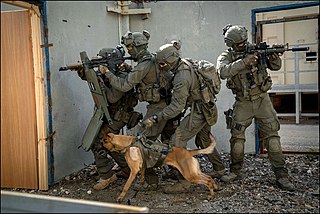
Counter-terrorism, also known as anti-terrorism, incorporates the practice, military tactics, techniques, and strategy that government, military, law enforcement, business, and intelligence agencies use to combat or prevent terrorism. Counter-terrorism strategy is a government's plan to use the instruments of national power to neutralize terrorists, their organizations, and their networks in order to render them incapable of using violence to instill fear and to coerce the government or its citizens to react in accordance with the terrorists' goals.

The Counterterrorism Division (CTD) is a division of the National Security Branch of the Federal Bureau of Investigation. CTD investigates terrorist threats inside the United States, provides information on terrorists outside the country, and tracks known terrorists worldwide. In the wake of the September 11, 2001 attacks, CTD's funding and manpower have significantly increased.
Terrorism and mass attacks in Canada includes acts of terrorism, as well as mass shootings, vehicle-ramming attacks, mass stabbings, and other such acts committed in Canada that people may associate with terroristic tactics but have not been classified as terrorism by the Canadian legal system.
Public Safety Canada, legally incorporated as the Department of Public Safety and Emergency Preparedness (PSEPC), is the department of the Government of Canada responsible for (most) matters of public safety, emergency management, national security, and emergency preparedness in Canada.
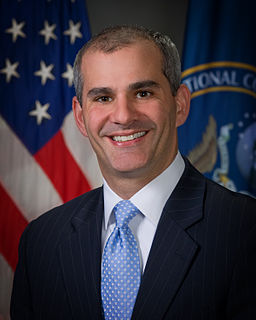
Michael E. Leiter was the director of the United States National Counterterrorism Center (NCTC), having served in the Bush Administration and been retained in the Obama Administration. A statement released by the White House announced his resignation, effective July 8, 2011. His successor, Matthew G. Olsen, was sworn in on August 16, 2011. In September 2017, Leiter joined international law firm Skadden, Arps, Slate, Meagher & Flom in Washington, D.C. as a partner in its national security practice.
The counter-terrorism page primarily deals with special police or military organizations that carry out arrest or direct combat with terrorists. This page deals with the other aspects of counter-terrorism:

The United Nations Interregional Crime and Justice Research Institute (UNICRI) is one of the five United Nations Research and Training Institutes. The Institute was founded in 1968 to assist the international community in formulating and implementing improved policies in the field of crime prevention and criminal justice. Its work currently focuses on Goal 16 of the 2030 Agenda for Sustainable Development, that is centred on promoting peaceful, just and inclusive societies, free from crime and violence.

Institute for National Security and Counterterrorism (INSCT) is a research institute sponsored by the Maxwell School of Citizenship and Public Affairs and Syracuse University College of Law. INSCT was established in 2003 by Prof. William C. Banks with the goal of support an interdisciplinary approach to questions of national security and counter-terrorism law and policy.
Randolph Post “R.P.” Eddy is an American businessman, investor, author, former US government official, and former United States and United Nations senior diplomat. He is the CEO of Ergo, a strategy and geopolitical intelligence firm headquartered in New York. He is also the CEO of Four Rivers, an investment firm focusing on Asia. Eddy and Richard Clarke are co-authors of a best selling and award winning book on forecasting and decision-making, published by HarperCollins. In addition, Eddy is the co-host of The Nantucket Project's "R.P. Daily" podcast. He was named by Foreign Policy Magazine as one of America's most authoritative terrorism and national security experts, Harvard Business Review heralded his business innovations as a "radical new model," and The New York Times, PBS, CNN, NPR, Fox and others refer to him as an expert on international affairs, transnational issues, national security, and corporate risk.

The Global Center on Cooperative Security is an independent, nonpartisan, not-for-profit research and policy institute based out New York, Washington D.C., London, Brussels, and Nairobi. The Global Center works to improve multilateral security cooperation through policy research and issue-area projects throughout the world.
The Global Counterterrorism Forum is an informal, apolitical, multilateral counter-terrorism (CT) platform that was launched officially in New York on 22 September 2011.
The International Centre for Counter-Terrorism (ICCT) is an independent think tank providing multidisciplinary policy advice and practical support focused on prevention and the rule of law, two important parts of effective counter-terrorism work. ICCT's work focuses on themes at the intersection of countering violent extremism and criminal justice sector responses, as well as human rights related aspects of counter-terrorism. The major project areas concern countering violent extremism, rule of law, foreign fighters, country and regional analysis, rehabilitation, civil society engagement and victims’ voices.

The Commonwealth Heads of Government Meeting 2015, also known as CHOGM 2015 was the 24th meeting of the heads of government of the Commonwealth of Nations. It was held in Malta from 27 to 29 November. Sri Lankan President Maithripala Sirisena handed the position of Commonwealth Chair-in-Office to Maltese prime minister Joseph Muscat at the meeting.
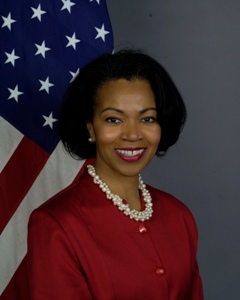
Gina Kay Abercrombie-Winstanley (born 1957) is an American diplomat who served as U.S. Ambassador to Malta. She was nominated by President Barack Obama and confirmed on March 29, 2012. She was sworn in on April 18, 2012, and presented her credentials to George Abela, President of Malta, on May 2, 2012. On April 12, 2021 she was sworn in to serve as Chief Diversity and Inclusion Officer for the United States Department of State.
The Counter Terrorism Group is an informal grouping of intelligence agencies from 30 European countries. CTG was founded in 2001 and includes agencies from all 27 European Union members, Norway, United Kingdom and Switzerland. MI5 of the UK is expected to continue to remain a part of the CTG after Brexit.
The Global Community Engagement and Resilience Fund (GCERF) is a nonprofit foundation based in Geneva, Switzerland. It is the first global effort to support local, community-level initiatives aimed at strengthening resilience against violent extremist agendas.
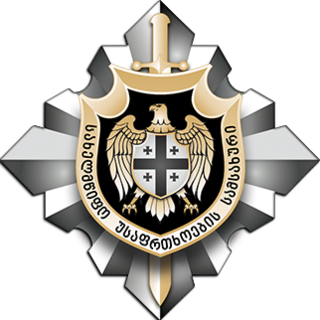
The State Security Service of Georgia (SSSG) is a state intelligence agency of the Republic of Georgia, which covers a broad spectrum of tasks to preserve national security in accordance to state legislature and relevant laws. Its missions are to protect the constitutional order, sovereignty, territorial integrity and military potential of Georgia from illegal acts of special services and individuals of foreign countries; to prevent violent and unconstitutional change of order and state authority. Further it is to ensure economic security and fight terrorism on national and international level, transnational organized crime and international crime as well as carry out measures towards prevention, detection and suppression of corruption.
The UN Counter-Terrorism Implementation Task Force (CTITF) was an instrument designed to roll out the UN Global Counter-Terrorism Strategy.
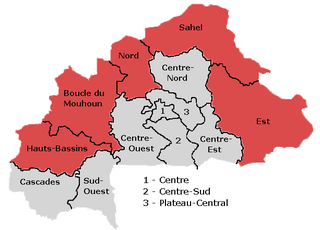
Terrorism in Burkina Faso refers to non-state actor violence in Burkina Faso that is carried out with the intent of causing fear and spreading extremist ideology. Terrorist activity primarily involves religious terrorism conducted by foreign-based organizations, although some activity occurs because of communal frustration over the lack of economic development. Recent attacks are concentrated in the Hauts-Bassins, Boucle du Mouhoun, Nord, Sahel, and Est regions, along the border with Mali and Niger. A series of attacks in Ouagadougou in 2016, 2017, and 2018 by al-Qaeda in the Islamic Maghreb and its affiliates was particularly deadly, garnering international attention.











